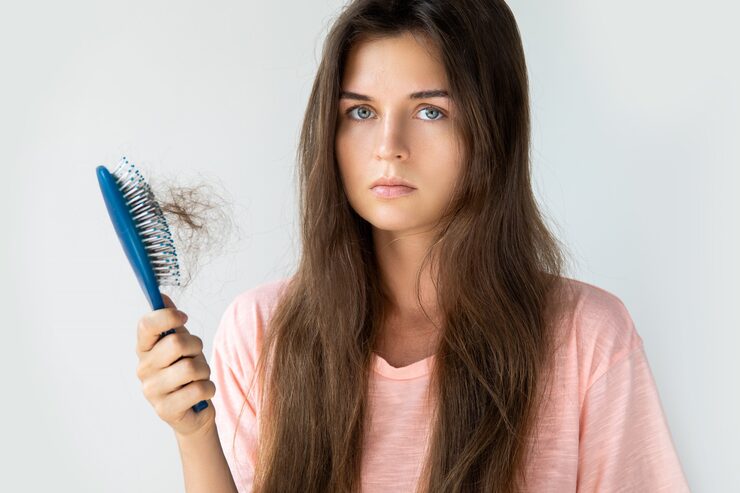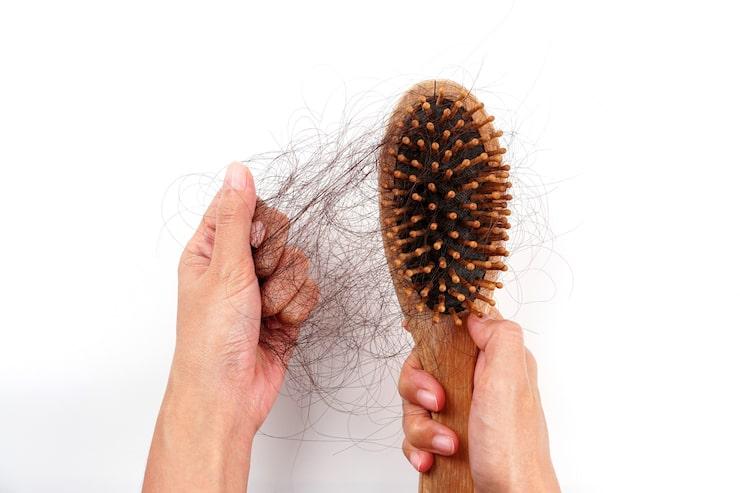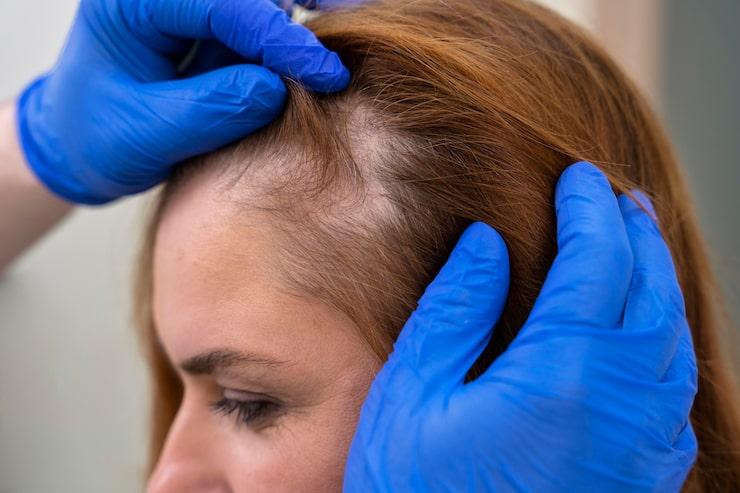
woman suffering from hairfall
People often think that hair shows how healthy, beautiful, and confident they are. However, when hair starts to thin or fall out excessively, it can cause anxiety and damage self-esteem. It's normal to lose some hair every day (50–100 strands), but if you lose a significant amount of hair or it continues to happen, it could be a sign of more serious health, nutritional, or lifestyle issues.
The good news is that you can significantly slow down hair loss and encourage stronger, thicker growth by following a good hair care routine and maintaining a healthy lifestyle.
1. Use a shampoo that is mild and doesn't contain sulfates.
Choosing the right shampoo is the first step to taking good care of your hair. Sulfates and harsh detergents are found in many store-bought shampoos. These chemicals can strip away natural oils, leaving your scalp dry and your hair brittle.
2. Add a massage with nourishing hair oil
Regularly oiling your scalp is one of the oldest and most effective ways to stop hair loss. Massaging your scalp with warm oil improves blood flow, moisturizes the roots, and strengthens the hair follicles.
Best oils for healthy hair:
How to use:
3. Don't skip conditioner; it protects your strands.
Conditioning is crucial for preventing hair breakage and maintaining its moisture. It helps eliminate knots in hair, reduces frizz, and seals the cuticles.
Tip: To prevent oil buildup, apply conditioner only to the ends and lengths of your hair, not your scalp. Let it sit for 2 to 3 minutes before rinsing it off with cool or lukewarm water.
4. Add a deep conditioning treatment or hair mask once a week.
Over time, pollution, heat styling, and the environment can all damage your hair. Using a hair mask once a week can help restore the nutrients and moisture your hair has lost.
Hair masks you make at home or with natural ingredients:
For severe hair loss or dryness, hospitals and dermatology clinics often suggest dermatologist-tested repair masks or in-clinic scalp treatments.
5. Give your hair the nutrients it needs from the inside out.
The health of your hair starts in the kitchen. Not getting enough protein, iron, zinc, and vitamins can make your hair thin and slow down its growth.
These are some healthy foods you should eat:

a bunch of hair that has fallen
6. Stay away from damage from heat and chemicals
Using straighteners, curling irons, or blow dryers too often can damage the hair cuticle, making the strands weak and more prone to breakage. Excessive coloring or chemical treatments can also strip away natural oils.
Here are some tips to reduce damage:
7. Be gentle—take care of your hair.
Rough handling while washing, drying, or combing can cause hair to break and fall out for no reason.
Tips for taking care of your hair:
8. Keep your scalp clean and healthy.
9. Take care of your stress; your hair does too.
Stress is one of the most common causes of hair loss, but it is often ignored. Telogen effluvium is a condition that happens when chronic stress changes the hair growth cycle. It causes more hair to enter the shedding phase.
Hospitals have counseling and stress management programs that can help you balance your mind and body if stress is hurting your mental health.
10. If your hair loss doesn't stop, see a dermatologist or trichologist.
It's time to get professional help if you've tried natural remedies and home care but are still losing too much hair or seeing it thin out.

person suffering from hair loss getting it checked by a doctor
1. What is the normal amount of hair that falls out each day?
It's normal to lose between 50 and 100 strands of hair per day. If it persists for weeks or longer, it may require attention.
2. Will changing my shampoo stop my hair from falling out?
If you use a mild, nourishing shampoo, it can help with scalp irritation and breakage, but it won't stop hair loss.
3. Does putting oil on your hair really help it grow?
Yes. Regular oil massages help the scalp receive more blood flow, become less dry, and strengthen the roots.
4. Is hair loss always permanent?
No. A significant amount of hair loss is only temporary and can be reversed with the right care and treatment.
5. When do I need to see a doctor?
If you notice bald spots, sudden hair loss, or persistent hair loss lasting more than a month, consult a dermatologist.
Hair loss can be upsetting, but most of the time it can be treated and reversed with the right care and medical advice. You can protect your hair, reduce breakage, and encourage natural regrowth by following these 10 healthy habits, which include gentle cleansing, scalp oiling, a balanced diet, and stress management.
At hospitals with advanced dermatology and trichology departments, specialists can create personalized treatment plans that incorporate medical therapies, nutritional guidance, and scalp treatments tailored to each individual's needs.
Start taking care of your hair today, and it will thank you tomorrow.
We offer expert care across key specialties, including Medicine, Cardiology, Orthopaedics, ENT, Gynaecology, and more—delivering trusted treatment under one roof.
Prakash Hospital Pvt. Ltd. is a 100 bedded NABH NABL accredited multispecialty hospital along with a center of trauma and orthopedics. We are in the service of society since 2001.
OUR SPECIALITIES
Contact Us
D – 12A, 12B, Sector-33, G. B. Nagar, Noida, Uttar Pradesh 201301
+91-8826000033

© 2026 All rights reserved.
Designed and Developed by Zarle Infotech